Articles and News
GIVING BACK: YVEL FUNDS A NEW JEWELRY SCHOOL FOR IMMIGRANTS | May 23, 2012 (1 comment)
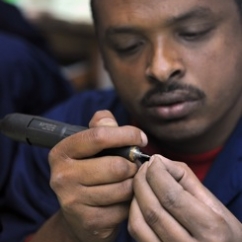
Jerusalem, Israel—Isaac Levy knows what it’s like to be poor and struggling. Though not apparent from looking at the elegant and successful luxury jeweler, as a child Levy’s family rose from a terrible setback to rebuild a life in a land where they had no friends, no family, and barely even spoke the language.
Levy’s father, Moshe, an Argentinian entrepreneur, moved his family from his native Buenos Aires to Israel in 1963. Being an entrepreneur, he came with money ready to invest in business, an Israeli sausage factory. But there things turned sour: the Levy family discovered that even in the Promised Land, there are crooks. After just three months, the owner of the sausage factory vanished, taking nearly all of Levy’s money with him and leaving the family, nearly broke, to struggle on its own. Five-year-old Isaac and his brother used to ask their father, “where was the sausage factory?” The elder Levy pointed to the plot of land—and taught his sons some unprintable words about the thief who stole their money.
His father’s disappointment and bitterness drove young Isaac to vow retribution. While he may not have heard the expression “living well is the best revenge,” it is exactly what he did: the very plot of land where the sausage factory once stood is again owned by a Levy and home to Yvel’s vast jewelry factory.
But if living well is the best revenge, giving back makes the revenge even sweeter. As his company grew, Levy vowed to use his newfound success and wealth to help other immigrants in Israel. Today, 90% of Yvel’s workforce is comprised of new immigrants: Americans, Russians, Syrians, Iraqis, Ethiopians, and more. In celebration of Levy’s devotion to their cause, he is hosting a special reception in Las Vegas on May 30 from 5:00 to 8:00 p.m. at the North Fairway Villa #212 at the Wynn Hotel. The reception, titled “Megemeria: A Genesis of Inspiration from Yvel,” celebrates the designer’s philanthropic endeavor--a school--to provide Ethiopian immigrants with skills to build a better life in Israel.
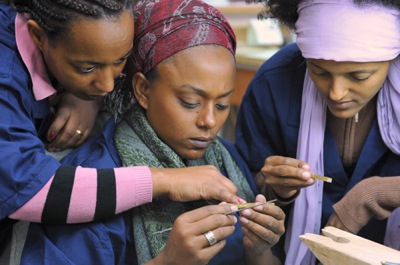
Students at Yvel's Andrea Bronfman School of Jewelry and Art, here and at top, learn skills that will enable them to have careers in the jewelry industry.
Of all immigrants, the Ethiopians most touched Levy’s heart. The Ethiopian Jews—called Falashas—are one of the oldest sects of Jews. Facing persecution in their native land, most of the Ethiopian Jewish population was rescued in the 1980s and early 1990s through a series of Israeli government operations, and brought to settle in Israel under the Law of Return, which states that any Jew has a right to Israeli citizenship.
While most Falashas lived in abject poverty before they emigrated, they found significant discrimination in their new home; something the egalitarian Levy says “drives him nuts.”
The Falashas’ brand of Judaism differs somewhat from the eastern European Ashkenazi or Mediterranean Sephardic practices that make up Israeli society today, but some scholars believe that due to their isolation, their practices may more closely mirror ancient Biblical times.
In an interview with the Jerusalem Post, Isaac Levy said, “I don’t understand how a country built on the ashes of six million Jews is discriminating against its own people. It’s beyond my comprehension.” The Ethiopian Jews, he says, are the most tolerant and sensitive, yet the most mistreated. Their children are even sometimes barred from public schools.
Isaac’s wife, Orna, a fourth-generation jeweler from the famous Mousaieff family, told the Post her husband has a very soft spot for these immigrants’ experience. “He always said, ‘Whenever we have the opportunity to do so, I want to do something for the Ethiopian community’.”
What he did was follow the ancient proverb that says if you give a man a fish you feed him for a day, but if you teach him to fish, you feed him for a lifetime. Partnering with non-profit organization Be-Atzmi, Levy built a jewelry school on the grounds of his vast facility—which also incorporates a wine cellar featuring samplings of local wines, a movie theater, a visitor’s center and small exhibit of the company’s jewelry. Not bad for an old sausage factory!
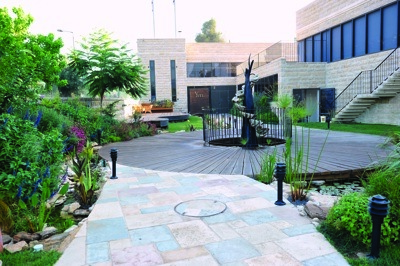
The grounds of Yvel's facility, above, once an old sausage factory whose owner defrauded Isaac Levy's father. Below, a visitors' exhibit inside Yvel's jewelry factory.
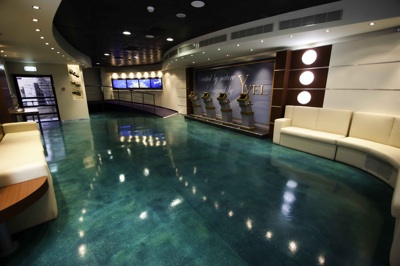
In the new school, which opened last year, Ethiopian immigrants learn skills that will enable them to earn a living, overcome poverty, and become a full part of both Israeli society and its workforce.
The school, about to graduate its first class, is named for Andrea Bronfman, the late wife of billioinaire philanthropist Charles Bronfman. It offers one-year training programs subsidized by contributions from donors and Be-Atzmi. Students are selected from immigrant absorption centers, and learn jewelry crafting, sketching, and drawing, as well as Hebrew lessons and Israeli history and culture. Graduates receive a certificate as licensed jewelry crafters from the Israeli Ministry of Industry, Trade, and Labor, and have the option of joining Yvel full time or seeking work as goldsmiths, pearl sorters, or diamond setters elsewhere.
The first graduating class are producing and distributing a fashion jewelry line to help raise funds for the long-term support and continuation of the school. The line, called “Genesis,” is comprised of pendants, earrings, bracelets and rings of 24k gold plated brass. Each incorporates a hidden word or message in Amharic, the native tongue of the Falashas. Personalized messages like initials, or inspirational words like “love” and “forever” are inscribed on ID-style bracelets, pendants on leather cords, and rings. Retail prices for the collection range from $50 to $200. It will be on display at the May 30 Megemeria event at the Wynn. All retailers with badges from Couture will be admitted; other retailers are invited to attend as well but must RSVP to Dani Chorost, usaservice@yvel.com, or call (212) 755-0688.
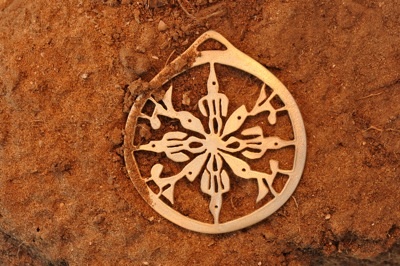
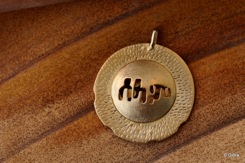
Two pendants from the Genesis student-designed collection. The one at right reads "Peace" in Amharic, the native language of Ethiopian Jews.
Orna Levy says the students are incredibly motivated. “They never miss an assignment or task, and they are never late. These are not people who have it easy, and they have had a very hard aliyah (immigration). But they are not willing to give up. They will do everything to come here and it’s just amazing,” she told the Post.
To be accepted, students go through a rigorous application process. Because all students have families and many are single parents, once they are accepted they are paid a monthly stipend to replace the income they would have had working as cleaning staff or security guards, typical of the only work most Ethiopians are able to find in Israel. A social worker helps with any personal, family, or social problems.
Sanayit Bayana, one of the first graduating class at the Andrea Bronfman school, said, “Isaac & Orna Levy try and tell us that we are equal in society, only now I can feel it. We will now have a profession and can work and progress like everyone else. Our children will see this and be very happy for us.”
Another graduate, Fantanesh Gavre Madhen, said, “It is like a family here. It is difficult, but if there is a desire, there are people here to help, really good people. I now feel like my place is in Israel is not just in cleaning [services], I am equal.”
Isaac Levy is just gratified to be able to share his own tremendous success with the Ethiopian community. "People have been talking about arvut hadadit (the principal of mutual concern for one another) and tzedek hevrati (social justice),” Levy told The Post. “Well, we’ve been doing it for 25 years.”
Levy’s father used angry words to tell his sons about the thief who thrust the family into poverty. But Levy’s actions speak louder than words to tell his fellow citizens how he feels about intolerance, hypocrisy, and discrimination.
To view Yvel’s latest collection and find out more about the Andrea Bronfman school, visit Yvel at Couture booth 532.







